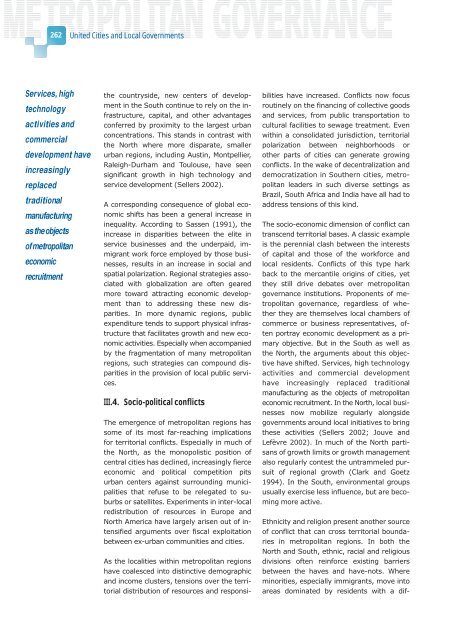GOLD Report I - UCLG
GOLD Report I - UCLG
GOLD Report I - UCLG
Create successful ePaper yourself
Turn your PDF publications into a flip-book with our unique Google optimized e-Paper software.
METROPOLITAN GOVERNANCE262United Cities and Local GovernmentsServices, hightechnologyactivities andcommercialdevelopment haveincreasinglyreplacedtraditionalmanufacturingas the objectsof metropolitaneconomicrecruitmentthe countryside, new centers of developmentin the South continue to rely on the infrastructure,capital, and other advantagesconferred by proximity to the largest urbanconcentrations. This stands in contrast withthe North where more disparate, smallerurban regions, including Austin, Montpellier,Raleigh-Durham and Toulouse, have seensignificant growth in high technology andservice development (Sellers 2002).A corresponding consequence of global economicshifts has been a general increase ininequality. According to Sassen (1991), theincrease in disparities between the elite inservice businesses and the underpaid, immigrantwork force employed by those businesses,results in an increase in social andspatial polarization. Regional strategies associatedwith globalization are often gearedmore toward attracting economic developmentthan to addressing these new disparities.In more dynamic regions, publicexpenditure tends to support physical infrastructurethat facilitates growth and new economicactivities. Especially when accompaniedby the fragmentation of many metropolitanregions, such strategies can compound disparitiesin the provision of local public services.III.4. Socio-political conflictsThe emergence of metropolitan regions hassome of its most far-reaching implicationsfor territorial conflicts. Especially in much ofthe North, as the monopolistic position ofcentral cities has declined, increasingly fierceeconomic and political competition pitsurban centers against surrounding municipalitiesthat refuse to be relegated to suburbsor satellites. Experiments in inter-localredistribution of resources in Europe andNorth America have largely arisen out of intensifiedarguments over fiscal exploitationbetween ex-urban communities and cities.As the localities within metropolitan regionshave coalesced into distinctive demographicand income clusters, tensions over the territorialdistribution of resources and responsibilitieshave increased. Conflicts now focusroutinely on the financing of collective goodsand services, from public transportation tocultural facilities to sewage treatment. Evenwithin a consolidated jurisdiction, territorialpolarization between neighborhoods orother parts of cities can generate growingconflicts. In the wake of decentralization anddemocratization in Southern cities, metropolitanleaders in such diverse settings asBrazil, South Africa and India have all had toaddress tensions of this kind.The socio-economic dimension of conflict cantranscend territorial bases. A classic exampleis the perennial clash between the interestsof capital and those of the workforce andlocal residents. Conflicts of this type harkback to the mercantile origins of cities, yetthey still drive debates over metropolitangovernance institutions. Proponents of metropolitangovernance, regardless of whetherthey are themselves local chambers ofcommerce or business representatives, oftenportray economic development as a primaryobjective. But in the South as well asthe North, the arguments about this objectivehave shifted. Services, high technologyactivities and commercial developmenthave increasingly replaced traditionalmanufacturing as the objects of metropolitaneconomic recruitment. In the North, local businessesnow mobilize regularly alongsidegovernments around local initiatives to bringthese activities (Sellers 2002; Jouve andLefèvre 2002). In much of the North partisansof growth limits or growth managementalso regularly contest the untrammeled pursuitof regional growth (Clark and Goetz1994). In the South, environmental groupsusually exercise less influence, but are becomingmore active.Ethnicity and religion present another sourceof conflict that can cross territorial boundariesin metropolitan regions. In both theNorth and South, ethnic, racial and religiousdivisions often reinforce existing barriersbetween the haves and have-nots. Whereminorities, especially immigrants, move intoareas dominated by residents with a dif-
















